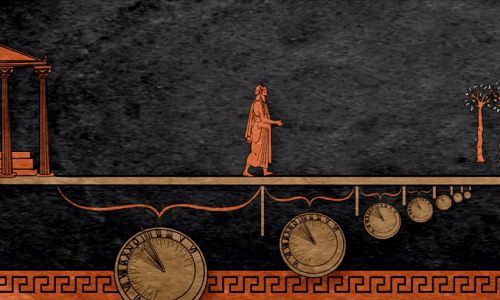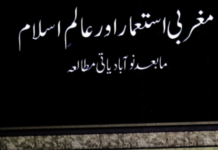Zeno of Elea-Philosopher and Mathematician-Urdu
زینو الیائی – قدیم یونانی فلسفی جس کے نظریات نے زمان و مکان، برہانیات اور حرکت کے مسائل پر بحث کی راہ ہموار کی
Zeno of Elea (c. 490 – 430 B.C.) was an important Pre-Socratic Greek philosopher from the Greek colony of Elea in southern Italy. He was a prominent member of the Eleatic School of ancient Greek philosophy. Parmenides founded this Eleatic School and he subscribed to and defended the Monist beliefs of Parmenides.

Achilles and Tortoise
The Paradox of Achilles and the Tortoise: If Achilles allows the tortoise a head start in a race, then by the time Achilles has arrived at the tortoise’s starting point. The tortoise has already run on a shorter distance. By the time Achilles reaches that second point, the tortoise has moved on again, etc, etc. So Achilles can never catch the tortoise.
Arrow and the Moment
The Arrow Paradox: If an arrow is fired from a bow, then at any moment in time. The arrow either is where it is, or it is where it is not. If it moves where it is, then it must be standing still. And if it moves where it is not, then it cannot be there. Thus, it cannot move at all.
Dichotomy Paradox
The Dichotomy Paradox: Before a moving object can travel a certain distance it must get halfway there. Before it can get halfway there, it must get a quarter of the way there. Before traveling a quarter, it must travel one-eighth; before an eighth, one-sixteenth; and so on. As this sequence goes on forever, an infinite number of points must be crossed, which is logically impossible in a finite period of time, so the distance will never be covered.
Composed of Numbers
That Zeno was arguing against actual opponents, Pythagoreans who believed in a plurality composed of numbers that were thought of as extended units is a matter of controversy. It is not likely that any mathematical implications received attention in his lifetime. But in fact, the logical problems which his paradoxes raise about a mathematical continuum are serious, fundamental, and inadequately solved by Aristotle. See also paradoxes of Zeno.
Zeno’s Purposes
The commonly found claim that the aim of Zeno was to defend the paradoxical monism of his Eleatic mentor, Parmenides, is based upon the speculations by the young Socrates of Plato’s Parmenides on Zeno’s ulterior motives. After the portion of the exchange between Socrates and Zeno quoted above (sect. 1), Socrates turns to Parmenides and says:
- In a way, he has written the same thing as you, but he’s changed it around to try to fool us into thinking that he’s saying something different. For you say in the verses you’ve composed that the all is one, and you do a fine and good job of providing proofs of this. He, on the other hand, says there are not many things, and he too provides numerous and powerful proofs. Given that one says “one” and the other “not many,” and that each speaks in this way so as to appear to have said none of the same things, when you are in fact saying virtually the same thing, what you’ve said seems said in a way that’s beyond the powers of the rest of us. (Pl. Prm. 128a6-b6)
Note: This article was originally published on our related blog. We have merged content from our educational subdomains to provide easier access in one place. The original post is still available at: https://videos.urdutubes.com/2019/04/zeno-of-elea-philosopher-and-mathematician-urdu.html
All content is owned and authored by us, and redistribution or reuse is not allowed without permission.
Note: This post is part of our content merger from multiple educational subdomains. To access the original content, visit: books.urdutubes.com for book-related content, PDFs, and downloads, or videos.urdutubes.com for video-related posts. All content is owned and authored by us, and redistribution or reuse is not allowed without permission.




![Khawateen Digest February 2025 [Download PDF] Khawateen Digest – February 2025 Edition: A Must-Read for Every Woman! The February 2025 issue of Khawateen Digest is packed with engaging stories, insightful articles, and practical tips that cater to the modern woman. From inspiring tales to expert beauty and health advice, this edition has it all. Whether you're in the mood for a gripping story or seeking helpful tips for daily life, this digest will keep you hooked. Don't miss out on the latest edition – download the Khawateen Digest February 2025 now and enjoy a well-rounded read that speaks to every woman's interests.](https://www.urdutubes.com/wp-content/uploads/2025/04/Khawateen-Digest-February-2025-Download-PDF-218x150.jpg)
![Khawateen Digest January 2025 [Download PDF] Khawateen Digest January 2025 [Download PDF]](https://www.urdutubes.com/wp-content/uploads/2025/04/Khawateen-Digest-January-2025-Download-PDF-218x150.jpeg)
![Kiran Digest April 2024 [Download PDF] Kiran Digest April 2024 [Download PDF]](https://www.urdutubes.com/wp-content/uploads/2025/04/Screenshot-2025-04-13-113317-218x150.png)
![Kiran Digest March 2024 [Download PDF]](https://www.urdutubes.com/wp-content/uploads/2018/05/KiranDigestMay2018255BDownloadFreePDF255D.jpg)





![Jasusi Digest June 2018 [Free Download Urdu Digest]](https://www.urdutubes.com/wp-content/uploads/2018/11/JasusiDigestNovember2018255BFreeDownloadUrduDigest255D.png)
[…] was patented in 1896 by Guglielmo Marconi. Marconi was a pioneer of wireless telegraphy. Born in Italy in 1874, he began experimenting with his inventions at the age of 20 after becoming aware of the […]